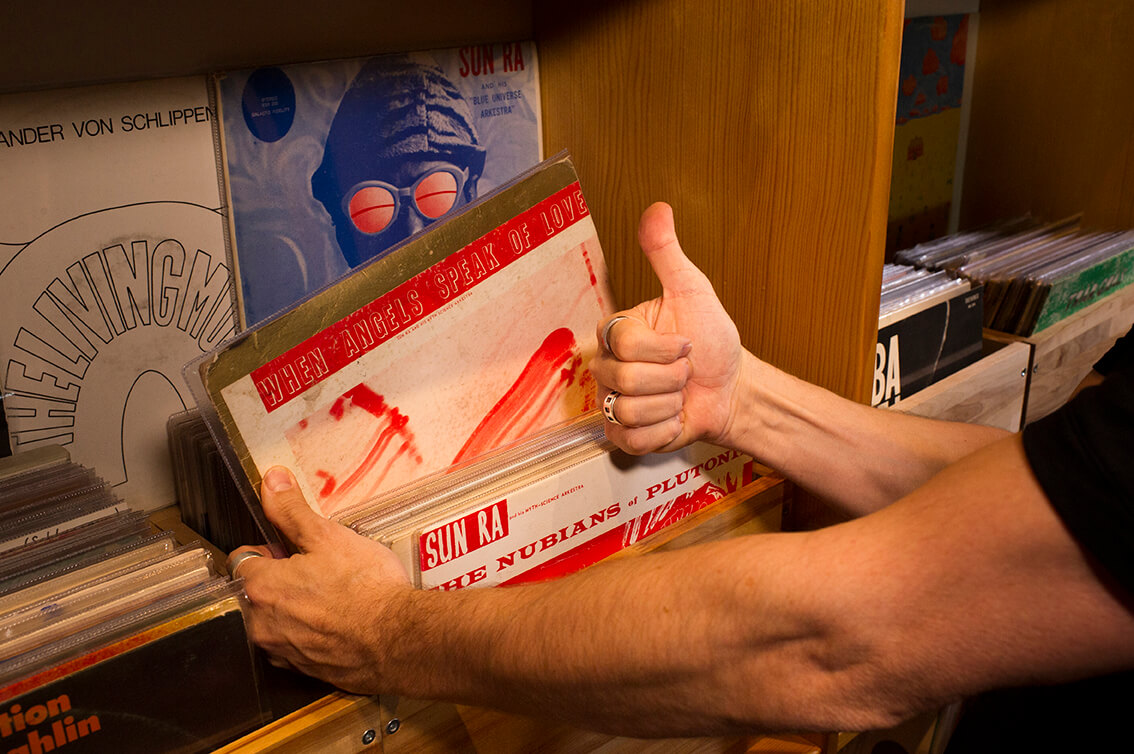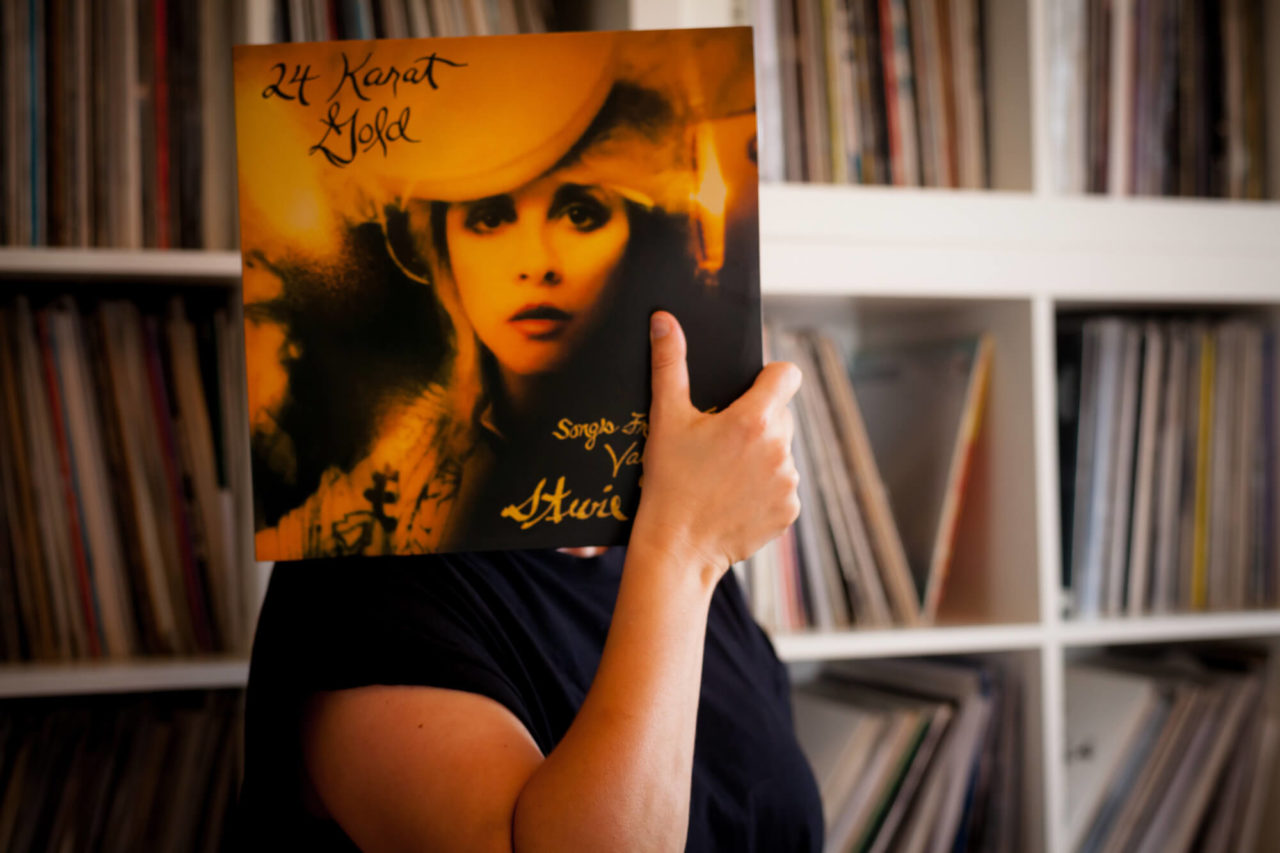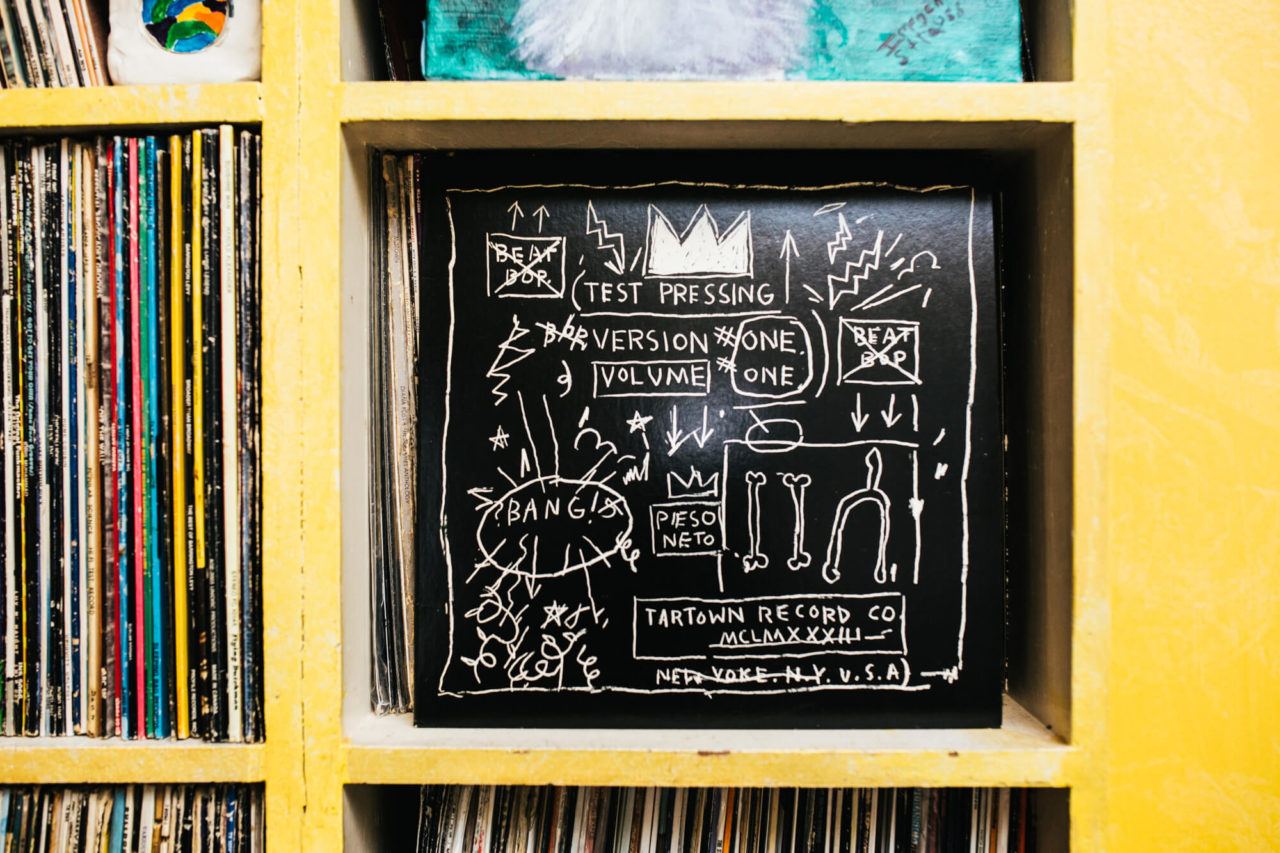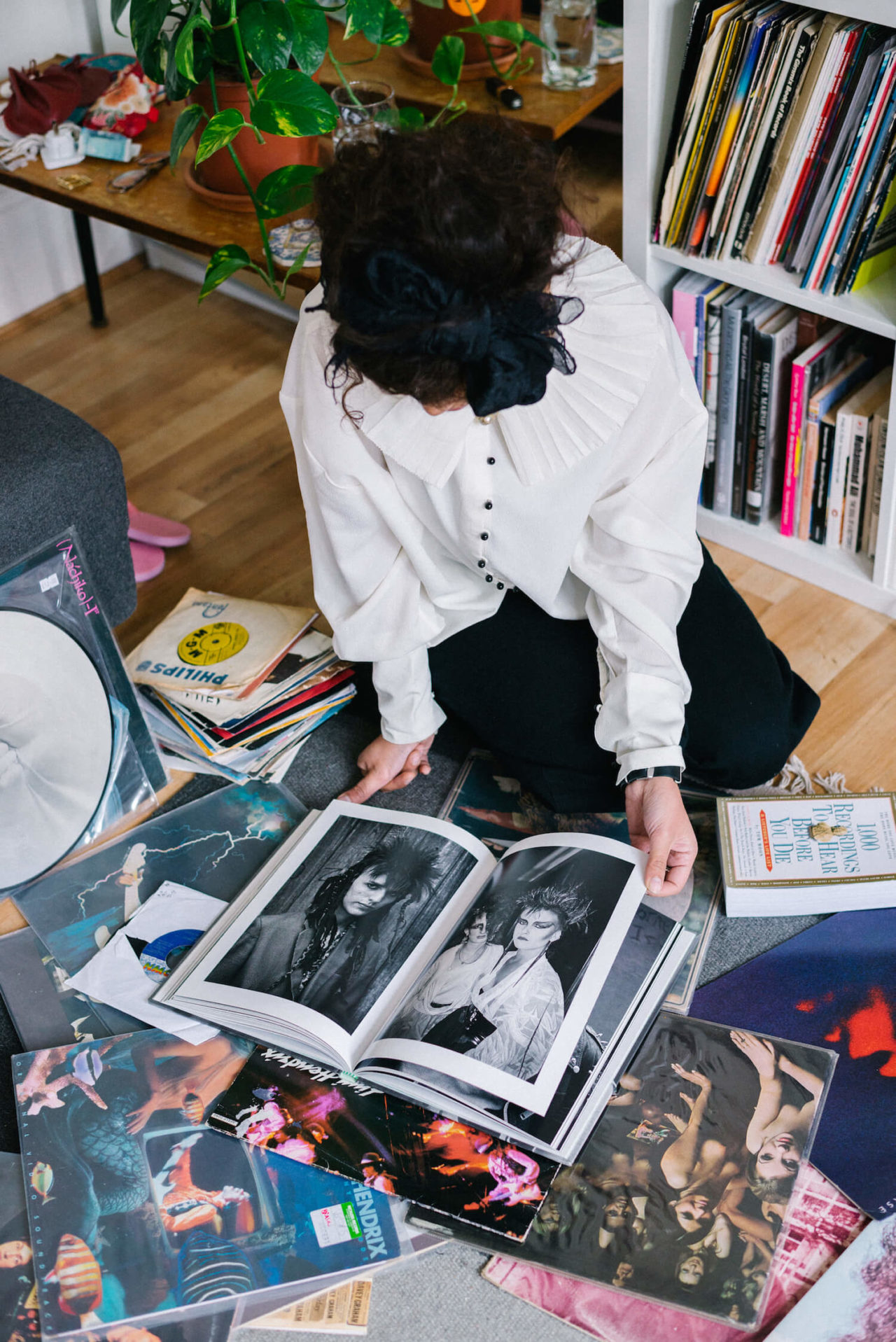
The best of Crate Diggers 2017
Inside the record collections of our favourite DJs, producers and musicians.
For those of you who are new to this, Crate Diggers is our monthly series taking you inside the record rooms of some of our favourite artists.
Using their records as a starting point, these in-depth interviews hope to tell a more intimate story of their lives in music, from childhood experiences to formative records and recent discoveries.
From New York, London and Berlin to rural Austria and Norway, we spent the year tracking down these global collections and sharing a little of the magic held within.
Scroll down to re-cap or discover interviews you may have missed over the course of the year.








Mats Gustafsson
Self-taught free jazz heavyweight and self-confessed Discaholic Mats Gustafsson has one of the most fabled record collections in Europe.
From his ‘vinyl cave’ in rural Austria, the saxophonist runs a global trade ring through his Discaholic website, trading four-digit rarities with the likes of Thurston Moore and Sunn O)))’s Stephen O’Malley.
And when he can’t find someone to trade with, Gustafsson has been know to travel across the continent to play solo concerts in exchange for rare records.
Buying free jazz since he was 12, Gustafsson was schooled in punk and retains a DIY attitude to this day. A saxophonist known for his ferocious style, he’s one of the most important free improvisors of his generation, playing with the likes of Barry Guy, Evan Parker, Jim O’Rourke and Sonic Youth or fronting his own projects like The Thing, whose 2012 collaboration with Neneh Cherry spanned an extraordinary wealth of influence.
For this first Crate Diggers of 2017, Gustafsson gave us rare access to his custom-built two-and-a-half tonne vinyl cave.
Read it here.




Sofie Fatouretchi
Born in Palo Alto, California, Sofie was raised on Iranian cassettes, classical records and The Electric Light Orchestra. She moved around the States a lot in her childhood years before relocating to Vienna to study at a music conservatory in her teens.
After cold mailing Peanut Butter Wolf, she landed an internship at Stones Throw and quickly became one of family. She’s also a Boiler Room original, a relationship which kicked off with their first West Coast broadcast which lined up Dam-Funk, J Rocc, Wolf and Sofie herself.
Sofie’s record collection is concise and personal, with sections for gifts and releases from friends, as well as shelves for classics, 12″s, soundtracks and Eastern European pysch. Sitting in her newly configured apartment, she spoke to us about her new Stones Throw compilation, record stores in Vienna and digging for Cyrillic vinyl with Primo.
Read it here.





Objekt
Following his debut album Flatland on PAN, TJ Hertz aka Objekt dropped ‘Objekt #4’ earlier this year, the latest in his club-focused white-label series that kicked off back in 2011, and one of our favourite 12″s of this year.
The record is a tribute to the now-shuttered Basement Q, a beloved haunt in Berlin’s Schöneberg ‘hood “which quietly but profoundly shaped the musical identities of Hertz and several of his contemporaries.”
You don’t have to spend long in Hertz’s record collection to see how committed he is to the art of DJing. One of the most functional, working collections we’ve experienced, it’s pure-fire house, techno and electro here, all united by a sense of “rhythmic propulsion.”
Yes, you might find a smidgen of African folk or the odd blues compilation but for Hertz, it’s not about owning prized objects but rather, symbiosis of sounds.
From his Autechre worship phase to the digi-dub 7″ he bought the day before our interiew, Objekt unlocked his record collection for VF Crate Diggers.
Read it here.





Maryisonacid
“Because Africa is mother of beat, and beat is tempo. May your hearts beat on our tempo and steps groove with our flow. On an acid trip around Afro rhythms, travelling from Nigeria, Ethiopia, Congo to Ghana, cruising on electronic sounds, cosmic rhythmics and psychedelic vibrations.” If those words doesn’t pique your interest, then African Acid probably is not for you.
Casually set up a few years ago by Maryama Luccioni aka Maryisonacid in a smokey Neukölln bar, the night has since racked up a dedicated following in a city dominated by techno. The music policy is broad, running from deep Ethio-jazz and Congolese wedding anthems to synthesizer pop, ska, reggae, rocksteady and more.
Surrounded by plants and flowers, we sat down with Maryama ahead of her set at The Vinyl Factory’s British Pavilion launch party at the Venice Biennale earlier this year, to talk Hailu Mergia, reissue culture, and digging amongst the dead in Corsica.
Read it here.





Joe Goddard
When Joe Goddard takes the stage at Prince Charles, an intimate dance venue in Berlin’s Kreuzberg neighbourhood, he seems almost sheepish, crouching behind his keyboard on the side of the stage. It’s the same position he assumes when performing with Hot Chip, his band of 15 years, but on those occasions he’s surrounded by his four bandmates, his mellowness contrasting with the dance party encircling him.
Tonight though, it’s just Joe, and it’s almost crazy to think that this soft-spoken man is responsible for some of the most indelible dance-pop of the last decade—but when he begins to play, and the crowd begins to sway with the beat, everything falls into place and within minutes, the whole dancefloor is a writhing, sweaty mess. Like any good dance musician, Joe hold his audience in the palm of his hand from the get-go, which is even more of an accomplishment here since he’s exclusively playing songs from his new solo record, the sharp and effervescent Electric Lines.
While Hot Chip are a band that have always been the sum of their parts, Electric Lines lays bare Joe’s immense contribution to the band’s success—as their principle composer, the album is a deeper exploration of the kind of disco, house, electro and pop tracks that are such a huge influence on Hot Chip’s sound. Tracks like the genre-pushing lead single ‘Home’ which marries a massively joyous ’70s funk sample from the Detroit band Brainstorm with a throwback to the days of the Paradise Garage, are a testament both to Joe’s encyclopaedic knowledge of dance music, and his ability to never let his finger off the pulse.
A few weeks after the Berlin show, we caught up with Joe in his London home, where he took us through his notoriously gigantic and jumbled home record collection. He touched upon everything from classic disco, to Japanese indie rock, to the enduring legacy of ‘Straight Up’ by Paula Abdul.
Read it here.




Leo Mas
If you were lucky enough to be at Amnesia in Ibiza in the late ’80s, chances are you limbered up to the sound of Leo Mas. Between ’85 and ’88, he and Alfredo set the agenda for the Balearic sound, with Mas’ expansive warm-up sets the blueprint for the genre-defying selector culture now blossoming in the post-Discogs world.
Something of a musical polymath, Mas owns a record room that is a meticulous chronicle of his life as a voracious collector, spanning a huge range of eras and scenes, from avant-garde jazz to contemporary house and techno. As radical with his politics as he is with his records, it’s nothing less than you’d expect from someone’s whose first 7″ was the soundtrack to an Italian ’70s erotic fantasy film.
On the eve of his headline performance at The Vinyl Factory’s Stromboli disco as part of this year’s Volcano Extravaganza festival, we visited Leo Mas in Milan to get the inside track on a record collection that truly changed the game for DJs around the world.
Read it here.





Steffi
It’s summer in Berlin, which means it’s pouring with rain. As Steffi offers us shelter from the elements, welcoming us into her spacious flat on the top floor of an altbau in Kreuzberg, a steady afternoon storm beats against the windows. The effect makes her record room seem cozy, a true sanctuary, with neat shelves of records piled almost to the ceiling.
At a first glance, it looks heavily curated, expertly pruned, the rock-solid collection of someone who has poured years and years into their passion for music. “For the first time in my life, I recently sold some stuff, which was really difficult,” explains the Dutch-born, Berlin-based DJ, as she gives us a detailed tour, section by section, genre by genre. “There are things that were either too damaged, or I’m ready to let go of it, which took 20 years.” She laughs and sighs at the same time.
Steffi is one of Berlin’s most well-known DJs, with her monthly residency at Panorama Bar now all but an institution unto itself. Earlier this year, she put out an already super-acclaimed Fabric mix, and in September, she released her third studio album, World of the Waking State, a subdued, sophisticated and hypnotic collection that melds together the most compelling aspects of her career to date.
With so much going on, it’s easy to imagine record collecting taking a back seat to all of her other endeavours, but a few inconspicuous piles of vinyl on the floor suggest that for Steffi, her collection is always a work in progress.
We sat down to discuss her beginnings in the south of Holland, her favourite records shops, and how she stays fresh and engaged in the international DJ scene after over 20 years in the game.
Read it here.





Mafalda
“I love when people play Pharoah Sanders in clubs.” It’s this impulse that brought Mafalda to London three years ago. Drawn to a city where DJs play jazz on the dancefloor, Mafalda has quickly made tracks as a joyful selector of spiritual grooves, straying gleefully across genres as a regular on NTS, Worldwide and festivals like Dimensions, where she’ll appear next month.
As Floating Points’ partner in crime she co-runs reissue label Melodies International, and has overseen the release of now iconic records by Aged In Harmony and Open Soul, originals of which you’d be more than likely to find at Cosmos, the London arm of the first pressings record shop where Mafalda also works.
Inviting us to the attic room of a small North London apartment, Mafalda begins by putting on her latest acquisition, Pharoah Sanders’ Love In Us All, a smile flashing across her face: “Pharoah Sanders is very special, I love all the records I have of his.”
Read it here.





Eamon Harkin
From watching his mother enjoy the festive show bands in Northern Ireland to seeing Gilles Peterson command a whole scene in London, Eamon Harkin’s journey to Mister Saturday Night has been informed by music’s ability to shape community.
With an open ear to music from across the spectrum, he and partner in crime Justin Carter have put this into practice, turning their party from local hang-out into a worldwide institution. Notching 250 parties in just eight years and marking the occasion with a fantastic compilation on its own label), Mister Saturday Night and brother-in-dance Mister Sunday are now on the verge of becoming part of the New York City furniture.
Such was the sense of bond between dancers and DJs that the pair raised over $100,000 on Kickstarter to help build their venue Nowadays into a permanent space, complete with two state-of-the-art sound systems: one for dancing and one for listening.
It’s an approach which is reflected in the organisation of Harkin’s 10,000-strong collection. When we spoke to him, he’d just received another big delivery, some of which were destined for the wall of house, techno and disco in the upstairs studio, the rest downstairs in the living room, where jazz, soul and ambient flank a valve amp and high quality speakers.
More of a toe-dipper than a deep digger, Harkin’s collection is the physical manifestation of the Mister Saturday Night ethos, where good music rules over rarity every time.
Read it here.





Lindstrøm
Growing up in a small coastal town on the outskirts of one of Europe’s main oil spots, Hans-Peter Lindstrøm’s initial forays into music may sound familiar to those who grew up far from the bright city lights. Church-oriented gatherings with neighbours and friends, choirs, organ music, Christian rock, and ’80s pop dominated, while pirate radio played from the surrounding rural islands. These were the unlikely origins that laid the foundation for a steep ascent to one of the leading lights of contemporary disco.
From the discovery, and recovery, of a bedraggled Boney M cassette on a remote Norwegian road, to crate digging excursions across Europe and Asia, Norwegian producer Lindstrøm’s record haul is as varied and far reaching as his own productions.
With his fifth solo album, It’s Alright Between Us As It Is, released this autumn on Smalltown Supersound, we visited Lindstrøm’s cosy studio in downtown Oslo to hear the stories behind that stunning wall of records.
Read it here.





Justin Strauss
A true NYC legend and resident DJ at the city’s most iconic clubs in the ’80s, Justin Strauss shared first-hand stories from the oft-mythologised scene that he shared with the likes of Jean-Michel Basquiat, Keith Haring, Larry Levan and many more.
It was a world where art, music and club culture grew hand-in-hand – where Keith Haring would dance to Larry Levan at Paradise Garage, where Thurston Moore rubbed shoulders with Jean-Michel Basquiat and Andy Warhol at Mudd Club.
Resident DJ everywhere from Area to the Ritz, Tunnel to Mudd Cub, Justin Strauss lived through it all, channeling this no holds barred approach to creativity through his eclectic DJ sets. Launching a career that has seen him release a cult album on Island when he was just a teenager, notch hundreds of remixes, and amass one of the finest record collections in New York, Justin’s Mudd Club was the physical and spiritual centre of the city’s downtown underground.
With Jean-Michel Basquiat’s headline show Boom For Real one of London’s headline exhibitions this autumn, we visited him in his NYC home to hear a first hand account of daily life in the rundown, beat-up, beautiful, creative and liberated melange of early ’80s New York City.
Read it here.





Nabihah Iqbal
Nabihah Iqbal is the artist formerly known as Throwing Shade, and although she has recorded all the parts on her debut album herself, and holds Prince in high esteem, the comparisons with the Purple One end there.
For many, the entry point for Iqbal’s music has been the regular NTS show she hosts, drawing on her training as an ethnomusicologist to share sonic journeys to countries around the world, based around rare recordings taken from her university’s vast sound archive. Whether it’s North Indian ragas or Arabic makams, rare afro-funk or Japanese ambient modes, her record collection reflects those journeys.
But Iqbal is no exclusivist, and her love for music from around the world stems first and foremost from her own curiosity to learn and impart that knowledge. “You might think you’re only into a certain type of music,” she says, “but if you let your mind wander, then you can gain so much more from it.”
It’s a more intuitive approach that has influenced Iqbal in recording her debut album Weighing of the Heart, which was released on Ninja Tune in December. A sum of her own musical loves, from ska and post-punk, grunge and ’80s pop to the trinity of Hendrix, Prince and Michael Jackson, Iqbal allowed these to coalesce unconsciously, and was almost surprised to hear how the record ended up sounding.
Read it here.









